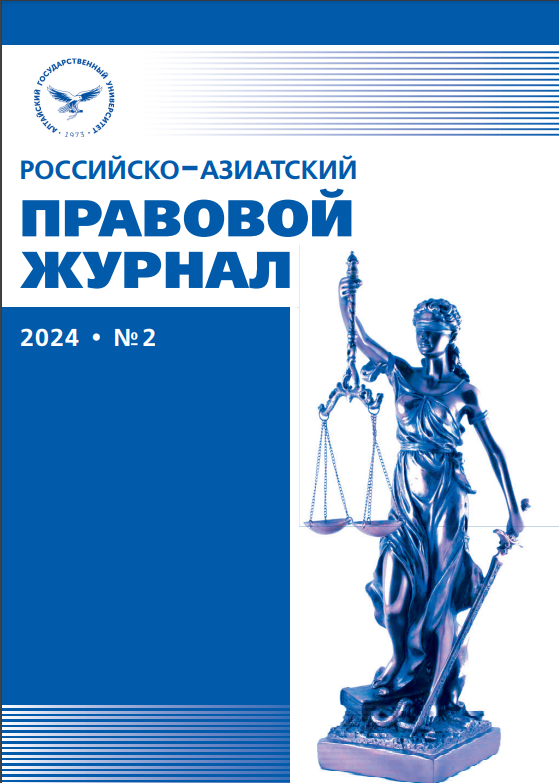ОБОСНОВАННОСТЬ РАЗГРАНИЧЕНИЯ СОСТАВОВ ПРЕСТУПЛЕНИЙ, ПРЕДУСМОТРЕННЫХ СТ. 285 И 286 УК РФ
УДК 343.2 ББК 67.408.018
Аннотация
Различие между статьями 285 и 286 Уголовного кодекса Российской Федерации, определяющими злоупотребление и превышение должностных полномочий, долгое время было объектом юридических дебатов. Автор исследования подвергает сомнению целесообразность разграничения этихпреступлений. Анализируются аргументы как сторонников, так и противников разграничения этихсоставов преступлений в уголовном законе РФ. С учетом сложившейся правоприменительной практики доказывается необходимость в уточнении признаков соответствующих составов преступлений.
Скачивания
Литература
Греков К.А. Соотношение категорий «Злоупотребление должностными полномочиями» и «Превышение должностных полномочий» в уголовном праве России // ЮП. 2007. №2. С. 115–117.
Демин А.А. Государственная служба в Российской Федерации : учебник для магистров. 9-е изд., перераб. и доп. М. : Юрайт; ИД Юрайт, 2016. С. 462–465.
Динека В.И. Уголовная ответственность за превышение власти или служебных полномочий сотрудников органов внутренних дел : автореф. дисс. … канд. юрид. наук. Екатеринбург, 1992. С. 30–31.
Ермаков С.В., Ермакова О.В. Превышение должностных полномочий: проблемы толкования общественно опасного деяния // Вестник УЮИ. 2022. №2 (96). С. 68–73. URL: https://cyberleninka. ru/article/n/prevyshenie-dolzhnostnyh-polnomochiy-problemy-tolkovaniya -obschestvennoopasnogodeyaniya (дата обращения: 10.12.2022).
Иванчин А.В. Концептуальные основы конструирования состава преступления : дис. … д-ра юрид. наук. Ярославль, 2014. С. 5.
ИванчинА.В., Зосиева М.В. Проблемы конструирования специальных составов преступлений //Юридическая наука. 2017. №4. URL: https://cyberleninka.ru/article/n/problemy-konstruirovaniyaspetsialnyh-sostavov-prestupleniy (дата обращения: 18.10.2023).
Кудрявцев В.Н. Общая теория квалификации преступлений. 2-е изд., перераб. и доп. М., 2001.
Статистика преступности Судебного департамента при ВС РФ. URL: http://www.cdep.ru/?id=79
Шиханов В.Н. Теория и практика квалификации должностных преступлений : учебное пособие. И., 2019. С. 411–413.
Copyright (c) 2024 М.В. Кукасов

Это произведение доступно по лицензии Creative Commons «Attribution» («Атрибуция») 4.0 Всемирная.
Авторы, публикующиеся в данном журнале, соглашаются со следующими условиями:
a. Авторы сохраняют за собой права на авторство своей работы и предоставляют журналу право первой публикации этой работы с правом после публикации распространять работу на условиях лицензии Creative Commons Attribution License, которая позволяет другим лицам свободно распространять опубликованную работу с обязательной ссылокой на авторов оригинальной работы и оригинальную публикацию в этом журнале.
b. Авторы сохраняют право заключать отдельные договора на неэксклюзивное распространение работы в том виде, в котором она была опубликована этим журналом (например, размещать работу в электронном архиве учреждения или публиковать в составе монографии), с условием сохраниения ссылки на оригинальную публикацию в этом журнале.
с. Политика журнала разрешает и поощряет размещение авторами в сети Интернет (например в институтском хранилище или на персональном сайте) рукописи работы как до ее подачи в редакцию, так и во время ее редакционной обработки, так как это способствует продуктивной научной дискуссии и положительно сказывается на оперативности и динамике цитирования статьи








